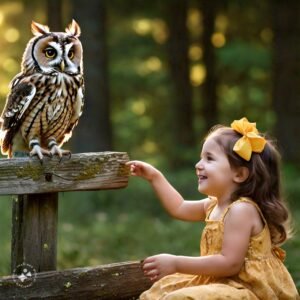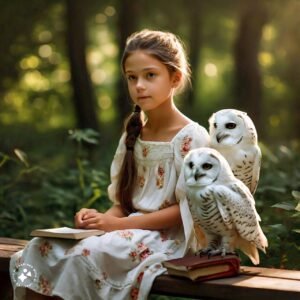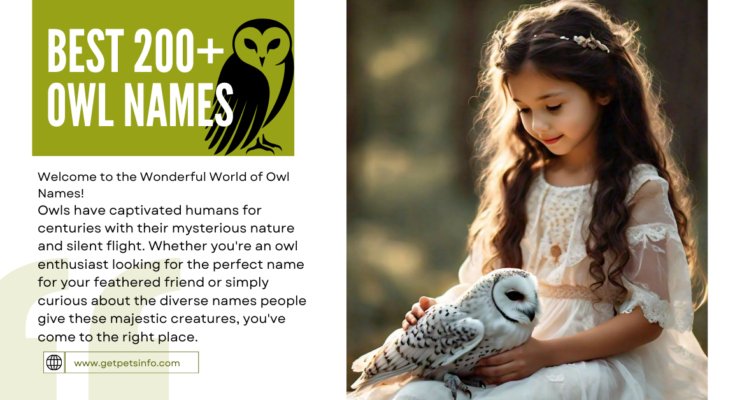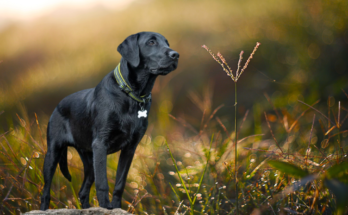Owl names: Owning an owl as a pet or encountering one in the wild can be a fascinating experience. One of the first steps in building a bond with your owl is choosing the right name. Whether you’re a new owl owner or simply captivated by these majestic creatures, finding the perfect name can add a personal touch to your interaction. Here’s a detailed guide on selecting owl names that suit their unique characteristics and charm.
Understanding Owl Characteristics

Before diving into specific names, it’s essential to understand the characteristics and behavior of owls. This understanding will help you choose a name that resonates with their traits:
- Nocturnal Behavior: Owls are primarily active at night, making names associated with darkness or moonlight particularly fitting.
- Silent Flight: Owls are known for their silent flight, which allows them to hunt stealthily. Names that reflect stealth or quietness can be a good match.
- Wide-eyed Stare: Their large, expressive eyes are a defining feature. Names related to vision or wisdom often reflect their appearance.
- Diverse Species: Owls come in various sizes and colors, from the tiny Elf Owl to the majestic Eagle Owl. Consider names that match the species’ physical attributes.
Popular Owl Names: Inspiration from Mythology, Literature, and Media

Owls have captivated human imagination for centuries, appearing in myths, legends, literature, and popular media. From wise and mystical beings to loyal companions, owl names often draw inspiration from these rich cultural references. Whether you’re looking for a name that resonates with ancient wisdom or one that reflects a beloved character, exploring popular owl names can help you find the perfect fit for your feathered friend.
Hootie, Nimbus, Luna, Merlin, Athena, Oliver, Hedwig, Apollo, Twilight, Archimedes, Snowy, Echo, Whisper, Midnight, Hazel, Oberon, Casper, Sapphire, Dusk, Peacock, Stardust, Mango, Celeste, Orion, Swoop, Tawny,
Seraphina, Mozart, Willow, Gryffin, Solstice, Ivory, Screech, Perseus, Alabaster, Velvet, Zephyr, Whimsy, Pippin, Azure, Ophelia, Sterling, Breeze, Glimmer, Atlas, Tundra, Moondust, Artemis, Frost, Sage, Nova, Aurora, Phoenix,
Ember, Sorrel, Jasper, Poppy, Albus, Lyra, Ash, Aster, Bubo, Calypso, Delphi, Eira, Fauna, Galileo, Hera, Indigo, Juno, Kaida, Larkspur, Mistral, Nia, Onyx, Pandora, Quill, Rigel, Sirius, Talon, Umbra, Vesper, Wren, Xanthe, Yarrow, Zephyrus, Amethyst, Basil, Cedar, Dandelion, Elara, Fern, Gossamer, Helios, Iris, Juniper, Kestrel, Lark, Meadow,
Nyx, Orion, Peregrine, Quasar, Rowan, Sequoia, Thalia, Ulysses, Verdigris, Whisper, Xena, Yara, Zenith, Aria, Blaze, Cypress, Dusk, Ember, Fawn, Glimmer, Harmony, Ivory, Jett, Kestrel, Luna, Moonbeam, Nightshade, Opal,
Peregrine, Quartz, Raven, Stella, Twilight, Luna, Merlin, Artemis, Echo, Frost, Sage, Nova, Aurora, Phoenix, Ember, Sorrel, Willow, Jasper, Poppy, Zephyr, Albus, Lyra, Nimbus, Ash, Orion, Luna, Merlin, Athena, Oliver, Hedwig,
Apollo, Twilight, Archimedes, Snowy, Echo, Whisper, Midnight, Hazel, Oberon, Casper, Sapphire, Dusk, Peacock, Stardust, Mango, Celeste, Orion, Swoop, Tawny, Seraphina, Mozart, Willow, Gryffin, Solstice, Ivory, Screech,
Perseus, Alabaster, Velvet, Zephyr, Whimsy, Pippin, Azure, Ophelia, Sterling, Breeze, Glimmer, Atlas, Tundra, Moondust.
Owl Names in Mythology and Symbolism

Throughout history, owls have held symbolic significance in various cultures around the world. Their association with wisdom, intelligence, and mystery has led to their portrayal in mythological stories and folklore:
- Athena: In Greek mythology, Athena, the goddess of wisdom and war, is often depicted with an owl as her symbol. Owls, particularly the Little Owl (Athene Noctua), were considered sacred to Athena and represented her wisdom and foresight.
- Lakshmi: In Hindu mythology, the goddess Lakshmi, associated with wealth, fortune, and prosperity, is sometimes depicted with an owl as her vahana (vehicle). The owl symbolizes her ability to see through illusion and perceive reality.
- Blodeuwedd: In Welsh mythology, Blodeuwedd is a woman created from flowers who is transformed into an owl as a punishment for betraying her husband. Owls in this context symbolize transformation and adaptation.
- Tlaloc: In Aztec mythology, the god Tlaloc, associated with rain, fertility, and water, is sometimes depicted with an owl companion. Owls were believed to have the ability to see through darkness, much like Tlaloc’s ability to bring rain during the night.
Owl Names Inspired by Literature and Folklore
Literature and folklore have also contributed to the popularization of owl names, often portraying these birds as wise mentors, mysterious guides, or loyal companions:
- Hedwig: Perhaps the most famous owl name in contemporary literature, Hedwig is the loyal snowy owl belonging to Harry Potter in J.K. Rowling’s series. Hedwig embodies loyalty, bravery, and the bond between wizard and familiar.
- Archimedes: Featured in Disney’s animated film “The Sword in the Stone,” Archimedes is Merlin’s wise and somewhat grumpy owl companion. He serves as a mentor to the young Arthur (Wart) and imparts wisdom through his sharp observations.
- Owliver: A playful twist on the name Oliver, Owliver emphasizes the owl connection while adding a whimsical and endearing touch. This name is popular among owl enthusiasts looking for a unique and catchy moniker.
Names Based on Famous Owl Characters
Beyond mythology and literature, owls have also become iconic through various media, including cartoons, comics, and advertisements:
- Woodsy Owl: An American icon since the 1970s, Woodsy Owl is a cartoon character used by the U.S. Forest Service to promote environmental conservation and protection. His motto, “Give a Hoot, Don’t Pollute,” encourages stewardship of natural resources.
- Bubo: Featured in the 1981 film “Clash of the Titans,” Bubo is a mechanical owl created by the god Hephaestus. Although not traditionally a real owl, Bubo became a beloved character in fantasy cinema.
- Owlowiscious: A character from the animated series “My Little Pony: Friendship is Magic,” Owlowiscious is Twilight Sparkle’s pet owl. He is depicted as intelligent, observant, and a loyal companion to Twilight and her friends.
Choosing a Popular Owl Names
When choosing a popular owl name, consider the following factors to ensure it suits your owl and reflects your personal preferences:
- Meaning and Symbolism: Research the meaning and symbolism associated with the name. Names like Athena or Merlin carry connotations of wisdom and magic, while names like Hedwig evoke loyalty and companionship.
- Personal Connection: Select a name that resonates with you personally. Whether it’s a childhood favorite from literature or a cultural reference that holds significance, a name that has personal meaning can deepen your bond with your owl.
- Pronunciation and Ease of Use: Choose a name that is easy to pronounce and distinct. Owls can learn their names and respond to them, so clarity in pronunciation is essential for effective communication.
- Longevity and Appeal: Consider whether the name will continue to be meaningful and appropriate as your owl grows and matures. A name with lasting appeal can become a cherished part of your owl’s identity.
Gender-Specific Owl Names
If you know the gender of your owl or prefer gender-specific names, here are some options to consider:
- Male Owl Names: Orion, Apollo, Merlin, Shadow
- Female Owl Names: Athena, Nova, Celeste, Twilight
Owl names : Names Based on Owl Species
Each owl species has unique characteristics that can inspire specific names. Here are a few examples:
- Owl names Barn Owl: Ghost, Ash, Willow
- Owl names Great Horned Owl: Titan, Echo, Aurora
- Owl names Screech Owl: Rusty, Ember, Whisper
Naming Considerations for Pet Owls
When naming a pet owl, consider its personality and how the name will resonate over time. Here are some practical tips:
- Owl names Short and Distinct: Choose a name that is easy to pronounce and distinct, as owls can learn their names and respond to them.
- Owl names Avoid Confusion: Ensure the name does not sound like common commands or noises to minimize confusion during training.
- Owl names Bonding Opportunity: Involve family members or friends in the naming process to create a personal connection with the owl.
Cultural and Mythological Owl Names
Explore names from various cultures and mythologies that have meanings associated with wisdom, strength, or mystery:
- Minerva: Roman goddess of wisdom, often depicted with an owl.
- Tahki: Native American name meaning “night hawk” or “owl.”
- Hooter: A playful nod to the owl’s distinctive hooting call.
Tips for Choosing the Best Owl Names
Choosing the perfect name for your owl is an important decision that reflects their unique personality and characteristics. Here are some detailed tips to help you find a name that your owl will respond to and that resonates with you:
- Research Names and Meanings: Explore different names and their meanings to find one that aligns with your owl’s traits or your personal preferences. Names with meanings related to wisdom, strength, or their species’ characteristics can be particularly fitting.
- Consider Pronunciation and Sound: Choose a name that is easy to pronounce and distinct. Owls can learn their names and respond to them, so clarity in pronunciation is essential for effective communication.
- Observe Your Owl’s Behavior: Spend time observing your owl’s behavior, habits, and personality traits. Their actions and mannerisms may suggest certain name themes or qualities that you can incorporate into their name.
- Personal Connection: Consider names that hold personal significance to you or your family. Whether it’s a name inspired by a favorite book, a cherished memory, or a cultural reference, a name that resonates personally can enhance the bond between you and your owl.
- Avoid Confusion: Ensure that the name you choose does not sound like common commands or noises used in training. This can minimize confusion and help your owl understand when you are addressing them specifically.
- Consultation and Collaboration: Involve family members, friends, or fellow owl enthusiasts in the naming process. Brainstorming together can lead to creative ideas and a name that everyone feels connected to.
- Trial Period: Sometimes, a name may not feel quite right immediately. Consider using a temporary name initially and observe how your owl responds to it. You can always make adjustments until you find the perfect fit.
- Resonance and Longevity: Choose a name that you can envision yourself using for the long term. A name that resonates with you emotionally and has lasting appeal will continue to strengthen your bond with your owl over time.
By following these detailed tips, you can navigate the process of choosing an owl name thoughtfully and confidently. The right name will not only reflect your owl’s unique qualities but also deepen the connection and mutual understanding between you and your feathered companion.
Exploring Owls: History, Personality, and Friendly Traits
Owl History
Owls have a rich historical significance across cultures and time periods, symbolizing wisdom, mystery, and spirituality. Understanding their historical context sheds light on their enduring allure:
- Ancient Symbolism: In ancient Greece, owls were revered as companions to Athena, goddess of wisdom.
- Cultural Significance: Native American tribes viewed owls as guardians of sacred knowledge and messengers between realms.
- Literary Influence: From Shakespearean plays to contemporary literature, owls continue to inspire as symbols of intuition and foresight.
Owl Personality
Owls, with their enigmatic nocturnal habits and impressive hunting prowess, exhibit a wide range of personalities across different species. From solitary hunters to social nesters, each owl species offers unique insights into their behavior and adaptation to diverse environments.
Adaptability to Habitats
Owls are found on every continent except Antarctica, showcasing their remarkable adaptability to various ecosystems:
- Habitat Diversity: Species like the Barn Owl thrive in open grasslands and agricultural areas, while the Great Horned Owl excels in forests and wooded regions.
- Urban Resilience: Some owls, such as the Eastern Screech Owl and Burrowing Owl, have adapted to urban environments, nesting in parks, gardens, and even abandoned buildings.
Nocturnal Predators: Silent Hunters of the Night
Owls’ nocturnal lifestyle is integral to their hunting success, characterized by stealthy techniques and acute senses:
- Silent Flight: Adaptations in their feather structure allow owls to fly silently, minimizing sound and enhancing their surprise attacks on prey.
- Vision and Hearing: Large, forward-facing eyes provide exceptional binocular vision, while specialized facial discs and asymmetric ears enhance their ability to pinpoint prey movements and sounds in the dark.
Social Dynamics: Solitary vs. Social Behavior
Owls exhibit diverse social behaviors depending on the species, ranging from solitary habits to communal nesting:
- Owl names Solitary Hunters: Species like the Snowy Owl and Northern Hawk Owl prefer solitary hunting grounds, maintaining territories and only coming together during the breeding season.
- Owl names Communal Nesters: In contrast, Burrowing Owls and some species of Eagle Owls nest in colonies, sharing burrows or utilizing communal roosts, indicating varying degrees of social interaction.
Communication and Vocalization
Owls communicate through a variety of vocalizations, each serving distinct purposes in their social and mating behaviors:
- Hooting: Recognizable in species like the Tawny Owl and Great Horned Owl, hooting serves as territorial markers and mating calls, signaling their presence to potential mates and rivals.
- Screeches and Whistles: Other species, such as the Barn Owl, utilize screeches and whistles for territorial defense or during courtship displays, showcasing their vocal versatility.
Parental Care and Lifespan
Owls demonstrate dedicated parental care and long lifespans, contributing to their ecological importance and conservation status:
- Nesting Habits: Females typically incubate eggs while males provide food, ensuring the survival of offspring until they fledge and become independent hunters.
- Longevity: Some owl species, like the Great Gray Owl and Snowy Owl, can live up to 10-15 years or more in the wild, adapting to environmental changes and demonstrating resilience in their lifecycles.
Friendly Owl Traits
Contrary to their nocturnal mystique, owls can display surprising friendliness under certain conditions, particularly in controlled environments:
- Bonding in Captivity: Owls in rehabilitation centers or sanctuaries often develop bonds with caretakers, demonstrating trust and curiosity.
- Interactive Behaviors: Certain species, like the Eastern Screech Owl, are known to vocalize and interact positively during educational programs.
- Respecting Boundaries: Understanding and respecting owls’ natural behaviors is crucial for fostering positive interactions without causing stress or harm.
Conclusion
Owls continue to fascinate and inspire awe through their historical symbolism, varied personalities, and occasional friendly interactions with humans. Whether exploring their cultural significance, studying their diverse behaviors, or experiencing their surprising sociability, owls remain integral to both natural ecosystems and human imagination.




